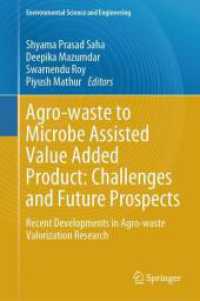Full Description
This book proposes an explicit recognition of criminology as a moral science: a philosophically textured appreciation of the presence and role of values in people's reasoning and motivation, set within an empirically rigorous social-scientific account. This endeavour requires input from both criminologists and philosophers, and careful dialogue between them. Criminology as a Moral Science provides such a dialogue, not least about the so-called 'fact-value distinction', but also about substantive topics such as guilt and shame.
The book also provides philosophically-informed accounts of morality in practice in several criminological contexts: these include whistleblowing practices within a police service; the dilemmas of mothers about who and what to tell about a partner's imprisonment; and how persistent offenders begin to try to 'turn their lives around' to desist from crime. The issues raised go to the heart of some currently pressing topics within criminology, notably the development of 'evidence-based practice', which requires some kind of stable bridge to be built between research evidence ('facts') and proposals for policy ('evaluative recommendations').
Contents
Introduction: The Nature and Scope of a Moral Science, Anthony Bottoms (University of Cambridge, UK) and Jonathan Jacobs (City University of New York, USA)
Part I: Orientations
1. Criminology and Moral Philosophy: Prospects for Fuller Engagement, Jonathan Jacobs (City University of New York, USA)
2. Implementing the 'Moral Turn' in the Social Sciences: Three Obstacles and Three Solutions, Christine Swanton (University of Auckland, New Zealand)
Part II: Criminal Justice-Related Ethical Dilemmas
3. Whistleblowing: An Ethical Analysis of Police Officers' Reporting of Misconduct by Colleagues, Justice Tankebe (University of Cambridge, UK)
4. Morality and Motherhood of (Ex-)Prisoners' Children, Caroline Lanskey (University of Cambridge, UK), Lucy Markson (University of Cambridge, UK), Karen Souza (United States Sentencing Commission, USA), Sophie Ellis (University of Cambridge, UK), Friedrich Lösel (University of Cambridge, UK) and Jennifer Barton-Crosby (NatCen Social Research, UK)
Part III: Moral Emotions: Shame And Guilt
5. A Plea for Guilt, Sophie-Grace Chappell (University of St. Andrews, UK)
6. Taking the Long View: The Role of Shame and Guilt in Desistance, Alice Ievins (University of Liverpool, UK)
Part IV: Desistance From Crime: Analyses In Positive And Critical Morality
7. 'Yo, God, What Should I Do?': Striving for Moral Consistency after Prison, Ryan Williams (University of Queensland, Australia)
8. Ethical Aspects of Journeys towards Desistance by Male Young Adult Recidivists, Anthony Bottoms (University of Cambridge, UK) and Caroline Lanskey (University of Cambridge, UK)
9. Living Non-Criminal Lives: What Role for the State? Matt Matravers (University of York, UK)







